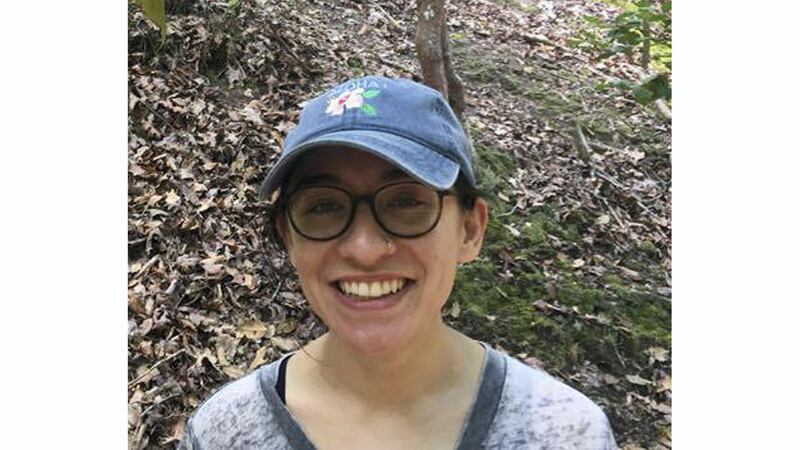Israeli authorities have branded her a threat to the state. But 22-year-old Palestinian American Lara Alqasem says all she wants to do is study human rights and transitional justice at the Hebrew University in Jerusalem.
Instead, Alqasem has been holed up in Israel's Ben-Gurion Airport for a week now, awaiting a court to decide if she can be deported for alleged activism for the Boycott, Divestment and Sanctions (BDS) movement, which Israel has criminalised.
"It is kind of a detention place. The conditions there are not great. But she is okay. At the moment the appeal is scheduled for Sunday," one of her lawyers, Yotam Ben Hillel, told The National.
The master's student and Florida native, whose grandparents are Palestinian, arrived at Ben-Gurion last Tuesday with a study visa approved by the Israeli consulate in Miami, Florida. But then border authorities flagged and detained her, citing a law Israel enacted last year that bans boycott supporters and information compiled by Canary Mission, a US-based organisation that gathers and publishes information on alleged BDS supporters.
Ms Alqasem has denied the charges. She told airport authorities and a court in Tel Aviv that she is no longer involved with the group in question, Students for Justice in Palestine (SJP), and was never “senior” in the national leadership, as the criteria for applying the anti-BDS law stipulates. By choosing to study at an Israeli university, she argued, she's clearly not boycotting the state.
"Since she is not involved the the organisation anymore and since the evidence against her is really not significant, I think the appeal should be accepted," Mr Hillel said.
But her decision to fight back and appeal the deportation has made her the face of, until recently, a largely silent battle being waged at Israel’s airports: the struggle to get in with dignity.
Israeli officials have denied entry to 16 people since the anti-BDS clause came into effect last March, according to officials.
Israel’s anti-BDS law does not distinguish between the range of boycott activities, from campaigns against products produced in illegal Israeli settlements to pressuring international companies, celebrities and academics not to do business in the country.
Advocates and human rights lawyers told The National they think the number is much higher because of this. Those targeted can be officially denied entry on grounds of providing false information or being non-compliant, when in fact BDS has played a major factor in the decision.
___________
Read more:
A new capital? Palestinians say Abu Dis is no substitute for East Jerusalem
There was a deeper, darker agenda afoot when the US administration cut UNRWA funding
Jerusalem mayor pushes ahead with proposal to remove UN agency from city
___________
That number also does not capture the hostile experiences Palestinians and travelers of Arab descent and with Muslim names say they have long experienced at Israel’s borders, and which Jewish activists are only now learning more about.
Anyone with Jewish heritage can easily immigrate to Israel, but the detention and denial of entry to Jews has rattled many Jewish communities, particularly in America where the population is more politically liberal.
According to the accounts of detained left-wing Jewish American activists, either border authorities or the Shin Bet, Israel’s internal security service, grilled them about their affiliations and activities, including trips to the occupied West Bank and work with Palestinians. Israel has also barred non-Jewish internationals.
Human rights lawyer Emily Schaeffer Omer-Man said the ultimate victims of these policies are the Palestinians.
“The impact of this law is essentially that Palestinians have fewer and fewer people to turn to,” she said, describing calls she’s received from Israeli, Jewish and other international activists in Israel now reconsidering their contact with Palestinians and the possible personal consequences.
Many Israeli and Jewish groups, however, have spoken out. In an unusual move, the Hebrew University asked to join Ms Alqasem’s appeal to the Tel Aviv court against her deportation and denounced the government’s attack on freedom of speech.
Three Israeli lawmakers also visited Ms Alqasem in detention on Sunday, after initially being denied. Professors from the Hebrew University were completely denied entry.
The US Embassy in Israel said it is aware of Ms Alqasem’s detention and is providing consular assistance.
Ms Alqasem said that at most ten people were part of her SJP chapter when she was the president and involved between 2016 to 2017. One campaign they supported included a boycott of an Israeli hummus company.
Israeli Prime Minister Benjamin Netanyahu’s government has likened BDS to a strategic threat on par with Iran and Lebanese Shiite militia Hezbollah.
"Israel has the right to decide which foreign nationals can enter," Strategic Affairs Minister Gilad Erdan told the Washington Post on Monday, adding that those who support BDS "seek to harm the state".
But one former Chief of Israel’s Shin Bet, Ami Ayalon, has slammed the practice of detaining and interrogating people for left-wing political beliefs as detrimental to the state and it’s long-term security.
"This is no longer a slippery slope," he told Israeli TV last week. "This is what is called a very steep slope."





